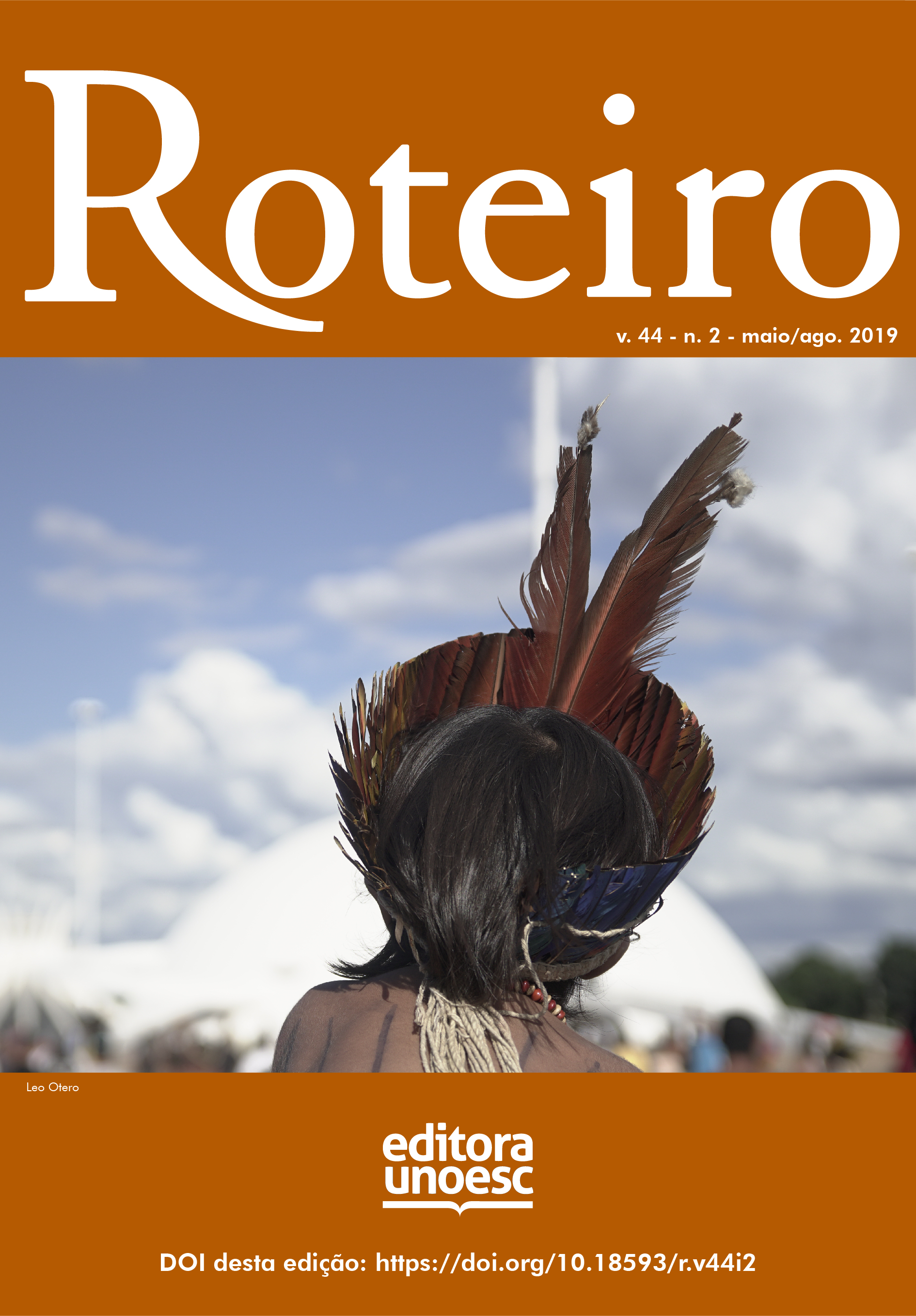Transdisciplinarity and interculturality: experiences lived and shared in the indigenous intercultural education course – UFG (2018)
DOI:
https://doi.org/10.18593/r.v44i2.17362Keywords:
Transdisciplinarity, Interculturality, Contextual theme, Indigenous studentsAbstract
The present article intends to present the concepts of “transdisciplinarity” and “critical interculturality” that permeated the dynamics of the classes on the Contextual Theme Intercultural Bilingual Education and, above all, to highlight the contribution of indigenous students in the classroom as representatives of their epistemologies. Their experiences pointed to the importance of deeper debates about diversity, difference and interculturality in the Brazilian educational context, a discussion based on three didactic activities proposed and carried out in class, in which narratives, written texts and documents images were developed. The productions and reflections were based on the principles of “enaction”, “transdisciplinarity”, “critical interculturality” (MATURANA, 2000; NASCIMENTO, 2014; VARELA; THOMPSON; ROSCH, 1992; WALSH, 2013; WALSH; VIAÑA; TAPIA, 2010) and their educational experiences. In analyzing their knowledge and uses in everyday life, students considered that in addition to the concept of “interculturality”, coined in the 1970s in Latin America, the so-called “interchange between peoples” (term rememored by them during classes) already existed as a practice, even before being used in public policy, at present.
Downloads
References
CANDAU, V. M. F. Educación intercultural en América Latina: distintas concepciones y tensiones actuales. Estudios Pedagógicos 36, n. 2, p. 343-352, 2000.
CANDAU, V. M. F.; RUSSO, K. Interculturalidade e educação na América Latina: uma construção plural, original e complexa. Revista Diálogo Educação, Curitiba, v. 10, n. 29, p. 151-169, jan./abr. 2010. DOI: https://doi.org/10.7213/rde.v10i29.3076
DIAS, T. C. Contatos e desacatos: os línguas na fronteira entre sociedade colonizadora e indígenas (1740 a 1889) – Goiás. Espaço Ameríndio, Porto Alegre, v. 7, n. 2, p. 205-226, jul./dez. 2013. DOI: https://doi.org/10.22456/1982-6524.41051
MALDONADO-TORRES, N. Transdisciplinaridade e decolonialidade. Revista Sociedade e Estado, v. 31, n. 1, p. 75-97, 2016. DOI: https://doi.org/10.1590/S0102-69922016000100005
MARIN, J. O. B. M. A formação de trabalhadores brasileiros: a experiência do Colégio Isabel. História Unisinos, n. 13, v. 2, p. 154-167, maio/ago. 2009. DOI: https://doi.org/10.4013/htu.2009.132.06
MATURANA, H. Transdisciplinaridade e cognição. In: CETRANS (org.). Educação e Transdisciplinaridade. 1. ed. UNESCO. São Paulo: TRIOM, 2000. p. 79-110.
MENDES, R. A. S. América Latina – interpretações da origem do imperialismo norte-americano. Projeto História, São Paulo, n. 31, p. 167-188, dez. 2005.
NASCIMENTO, A. M. Interculturalidade: apontamentos conceituais e alternativa para a educação bilíngue. Revista Sures, n. 3, 2014. Disponível em: https://revistas.unila.edu.br/index.php/sures/article/view/121/127. Acesso em: dez. 2014.
NAZARENO, E. História, tempo e lugar entre o povo indígena Bero Biawa Mahãdu (Javaé): a partir da interculturalidade crítica, da decolonialidade e do enfoque enactivo. In: OLIVEIRA, M. J. (org.). Direitos humanos e pluriversalidade: conexões temáticas. 1. ed. Curitiba: Editora Prismas Ltda, 2017. p. 85-118.
NAZARENO, E.; ARAÚJO, O. C. G. Reflexões em torno do tema contextual “Etnicidade e diversidade cultural”. Revista Articulando e construindo saberes, Goiânia, v. 2, n. 1, 2017. DOI: https://doi.org/10.5216/racs.v2i1.49007
NOSSOS ESPÍRITOS não falam inglês: internato indígena. Direção: Chip Richie, Produção: Steven Heape. [Estados Unidos: s. n.], 2008. 1 vídeo (52 min.).
PIMENTEL DA SILVA, M. do S. A pedagogia da retomada: decolonização de saberes. Articulando e Construindo Saberes, Goiânia, v. 2, n. 1, p. 204-216, 2017. DOI: https://doi.org/10.5216/racs.v2i1.49013
PIMENTEL DA SILVA, M. do S. As línguas indígenas na escola: da desvalorização à revitalização. Signótica, v. 18, n. 2, p. 381-395, jul./dez. 2006. DOI: https://doi.org/10.5216/sig.v18i2.2793
PIN, A. E. História da educação do povo Javaé: do período colonial à República. Dissertação (Mestrado em História) – Universidade Federal de Goiás, Goiânia, 2014.
REPETTO, M. Os sentidos das fronteiras na transdisciplinaridade e na interculturalidade. Textos & Debates, Boa Vista, n. 22, p. 13-30, jul./dez. 2012. DOI: https://doi.org/10.18227/2317-1448ted.v2i22.1602
STEIL, C. A.; CARVALHO, I. C. M. Epistemologias ecológicas: delimitando um conceito. Mana: Estudos de Antropologia Social, n. 20, v. 1, p. 163-183, 2014. DOI: https://doi.org/10.1590/S0104-93132014000100006
THIAGO, E. M. C. P. S. O texto multimodal de autoria indígena: narrativa, lugar e interculturalidade. Tese (Doutorado em Estudos Linguísticos e Literários em Inglês) – Universidade de São Paulo, São Paulo, 2007.
UNIVERSIDADE FEDERAL DE GOIÁS. Projeto Político Pedagógico. Licenciatura Intercultural. Goiânia: UFG, 2011.
VARELA, F. J.; THOMPSON, E.; ROSCH, E. De cuerpo presente: las ciencias cognitivas y la experiencia humana. Barcelona: Editorial Gedisa, 1992.
WALSH, C. (org.). Pedagogías decoloniales: prácticas insurgentes de resistir, (re)existir y (re)vivir. Tomo I. Quito-Ecuador: Ediciones Abya-Yala, 2013. p. 23-68.
WALSH, C.; VIAÑA J.; TAPIA, L. Interculturalidad crítica y educación intercultural. Bolívia: Instituto Internacional de Integración, 2010. p. 75-96.
Published
How to Cite
Issue
Section
License
Copyright Notice
The authors retain copyright and grant the Journal the right of first publication, with the work simultaneously licensed under a Creative Commons – Attribution – 4.0 International license.












